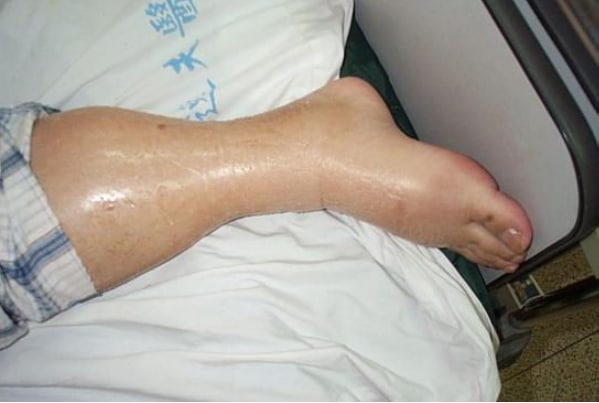Leg, foot, and ankle swelling is called peripheral edema. Edema is the term for fluids that accumulate in these areas. Edema that is limited to just the legs is called lymphedema. Edema in the leg can also be associated with edema all over the body. In this case the swelling is the result of a condition affecting the whole body such as heart failure or kidney failure, this is much less common and can be an indication of something more serious. In lymphedema, the buildup is most often experienced slowly and usually worsens when on your feet and improves with elevation.
Causes of Lymphedema [isolated leg edema]
There are many things that can cause swelling of just the legs or lymphedema:
• Being overweight [very common]
• Chronic vein disease [very common]
• Standing or sitting for extended time periods
• Certain medications
• Infection – especially skin infection in the leg
• Injuries or surgery which can damage lymphatic flow
• Cancer and its treatment like radiation treatment
• Blood clot or DVT in the leg
Venous insufficiency or vein disease is one of the main factors contributing to leg edema and it is important to have this condition treated as soon as possible. Leg edema caused by venous insufficiency is actually one of the many stages of vein disease. With this type of edema, the correct blood flow is impaired and will then cause the inability of the body to properly reabsorb fluids; this will then cause the swelling.
Treating Leg Edema
There are several home remedies and therapies that can be tried if you are experiencing leg swelling. Treatment methods include:
• Elevating the legs
• Staying active, with attention on stretching and moving the legs
• Avoiding clothes that can restrict proper circulation
• Maintaining a healthy weight
• Wearing compression socks
It is important to See a Doctor Early
It is important to diagnose the cause and treat leg edema early and comprehensively. If allowed to progress, the leg can swell and it can lead to a permanent disability. If your swelling is limited to your leg, ideally see someone who is a specialist in venous and lymphatic diseases as they will be best equipped to diagnose lymphedema. Usually this involves a leg ultrasound. Leg swelling can also be a symptom of a more serious condition. Be sure to tell your physician if you have certain medical conditions, such as heart, liver, or kidney disease. Other symptoms associated with leg swelling that may require more urgent medical attention include:
• A high temperature or fever
• Dizziness
• Feeling faint
• Trouble breathing
• Pain in the leg/s
During your examination, your doctor will perform a complete physical and will recommend additional tests such as an ultrasound of your leg. You should be prepared to tell your physician the time of day the swelling is worse, other symptoms, and if you notice things that make the swelling better or worse.
Dr. Wright and his team at St. Louis Laser Veins Center are experienced and knowledgeable about treating all types of vein disease. We encourage you to schedule an appointment with us if you are experience leg edema. We want to ensure your overall health!
Photo By Wang Kai-feng, Pan Hong-ming, Lou Hai-zhou, Shen Li-rong, Zhu Xi-yan – Wang Kai-feng, Pan Hong-ming, Lou Hai-zhou, Shen Li-rong, Zhu Xi-yan: [http://www.biomedcentral.com/content/pdf/1471-2407-11-204.pdf Interleukin-11-induced capillary leak syndrome in primary hepatic carcinomapatients with thrombocytopenia.] In: BMC Cancer 2011, 11:204 doi:10.1186/1471-2407-11-204 (Open Access), CC BY 2.0, https://commons.wikimedia.org/w/index.php?curid=15371096

